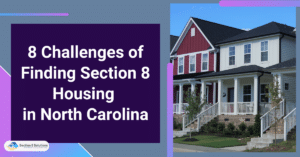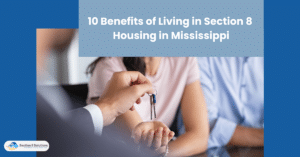Maine Section 8 income limits vary by family size. Maine’s four-person family income limit was $43,950 in September 2021. However, these values may have changed since then, so reference the newest Maine State Housing Authority rules for precise information.
This blog aims to provide detailed information about the income limits associated with Section 8 housing in Maine.
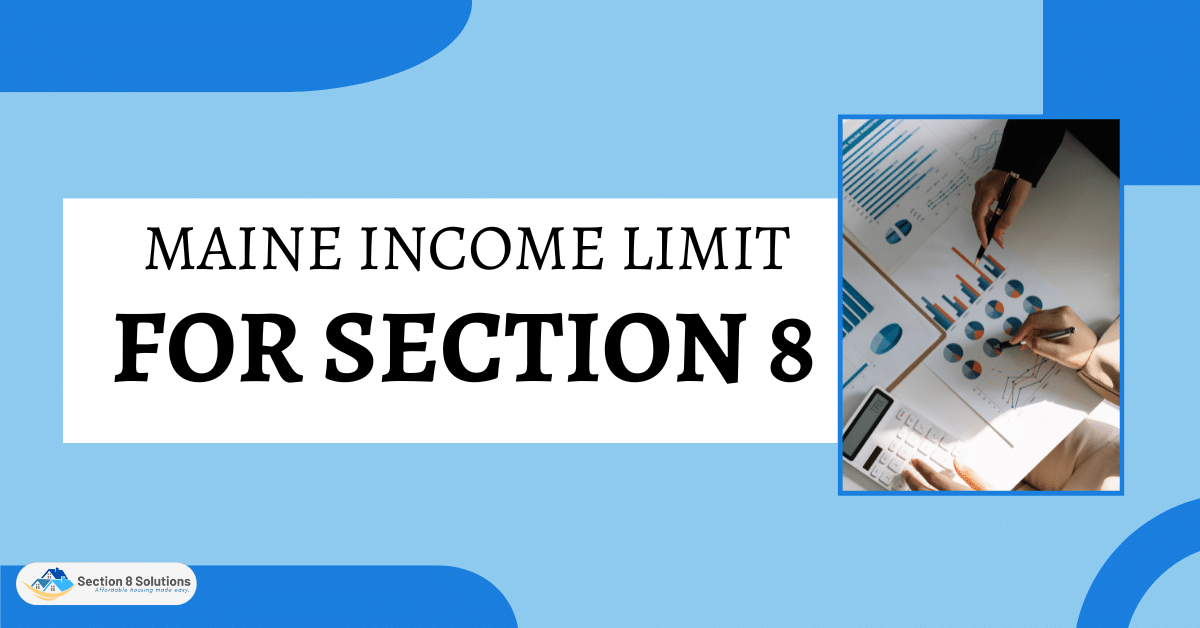
What is Section 8 Housing?
Section 8 housing is a government assistance program in the United States, including in Maine, that aims to provide safe and affordable housing options for low-income individuals and families. The program operates by subsidizing a portion of the rent for eligible participants, allowing them to secure housing in the private rental market.
The primary goal of Section 8 is to bridge the gap between housing costs and income, ensuring that low-income households have access to decent and sustainable housing. This program offers numerous benefits, such as reducing the financial burden of rent, promoting housing stability, and improving the overall quality of life for those in need.
In Maine specifically, Section 8 housing provides an essential safety net, offering individuals and families the opportunity to secure affordable and suitable housing within their communities.

Determining Eligibility for Section 8 Housing
To be eligible for Section 8 housing in Maine, individuals and families must meet specific criteria set by the Maine State Housing Authority (Maine Housing). The eligibility requirements include:
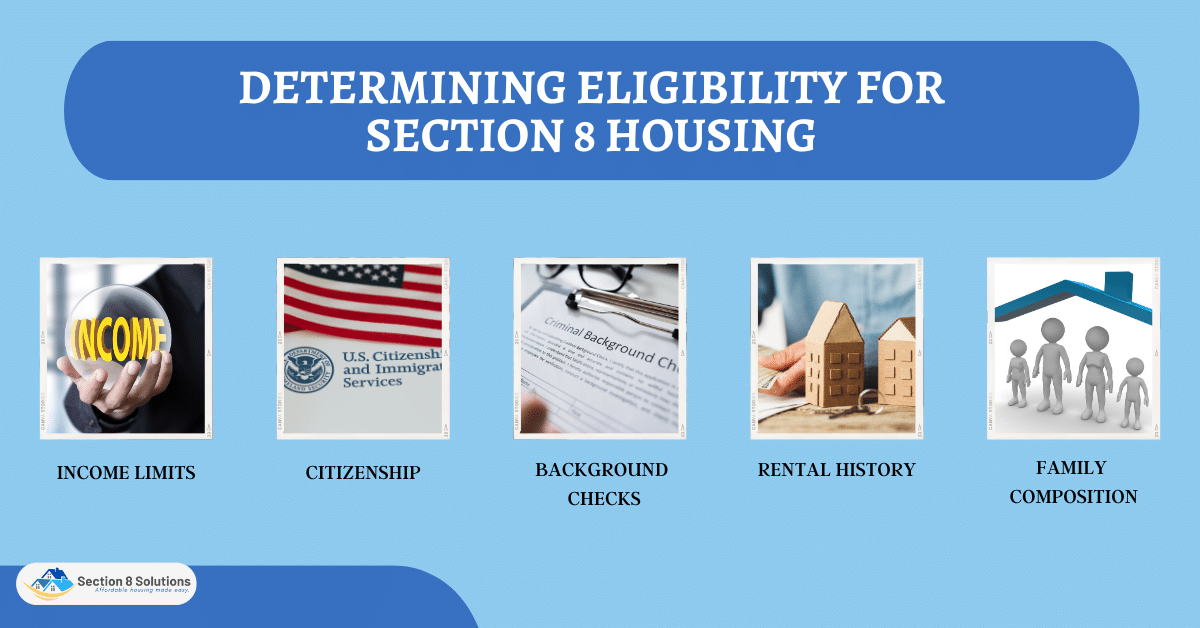
- Income Limits: Applicants must have a household income below a certain threshold, which is determined based on the size of the household. The income limits take into account the total combined income of all household members.
- Citizenship or Eligible Immigrant Status: Applicants must be either U.S. citizens or have eligible immigrant status. MaineHousing requires documentation to verify citizenship or immigration status.
- Background Checks: Applicants are subject to background checks, which typically include criminal background screenings. Certain criminal convictions may disqualify individuals from participating in the Section 8 program.
- Rental History: Applicants are typically required to provide a rental history, including information about previous landlords and any evictions or rental-related issues.
- Family Composition: Section 8 eligibility considers the composition of the household, including the number of individuals and their relationships. Priority is often given to households with children, elderly individuals, or people with disabilities.
It is important to note that meeting the eligibility criteria does not guarantee immediate assistance, as Section 8 housing often has limited availability. There may be waiting lists or priority categories based on specific needs or circumstances.
Income Limits for Section 8 Housing in Maine
Maine Section 8 income restrictions depend on family size. These boundaries guarantee MaineHousing helps the neediest. These values are subject to change, so check MaineHousing’s newest standards for the latest information.
Here is a general overview of the income limits for Section 8 housing in Maine, based on household size (as of September 2021, but subject to change):
1 person: The income limit is approximately $30,600 per year.
2 people: The income limit is approximately $35,000 per year.
3 people: The income limit is approximately $39,350 per year.
4 people: The income limit is approximately $43,700 per year.
5 people: The income limit is approximately $47,200 per year.
For each additional household member, an additional amount is added to the income limit. These figures may vary slightly depending on the specific location within Maine.
Maine Housing may change these income limitations. Median income, program requirements, and financing might affect income limitations. To determine Maine Section 8 housing eligibility, it is recommended to review Maine Housing’s newest standards and income limitations.

Determining Income for Section 8 Eligibility
Maine Housing considers income and deductions when assessing Section 8 eligibility. Applicant income and eligibility assessments depend on understanding these aspects. Common income and deductions:
- Employment Earnings: Wages and salaries from employment are typically considered as income. This includes income from full-time, part-time, and seasonal jobs. Self-employment income may also be included, but specific guidelines may apply.
- Social Security Benefits: Social Security retirement benefits, disability benefits, and Supplemental Security Income (SSI) are sources of income that are considered. These benefits are taken into account when calculating the total household income.
- Public Assistance: Income received from other public assistance programs, such as Temporary Assistance for Needy Families (TANF), General Assistance, or Veterans Benefits, may be included as part of the total household income.
- Unemployment Benefits: Unemployment compensation is typically considered as income. However, the specific guidelines for calculating its inclusion may vary.
- Child Support and Alimony: Income received from child support or alimony payments is generally counted as income.
- Deductions: Certain deductions may be considered when calculating income for Section 8 eligibility. These deductions can include medical expenses, child care expenses, and expenses related to elderly or disabled family members.
Income calculation norms might alter. Maine Housing’s or their local housing authority’s current criteria on income sources and deductions should be used to determine Section 8 housing eligibility.
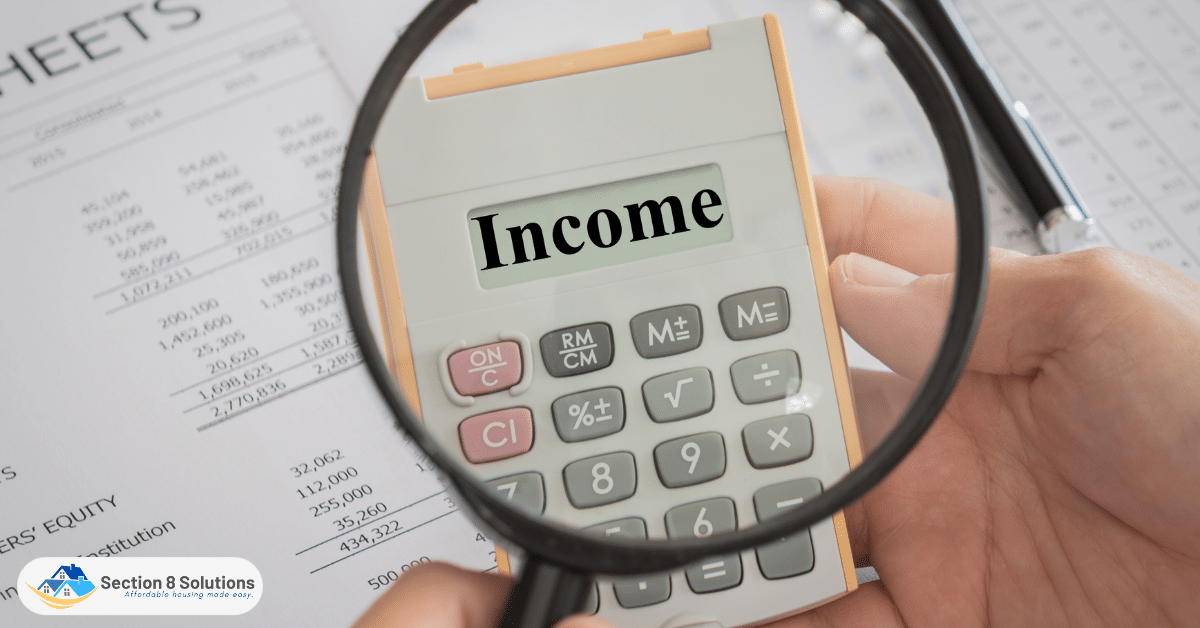
Applying for Section 8 Housing in Maine
Applying for Section 8 housing in Maine involves a series of steps and requires specific documents and information. Following this step-by-step guide will help individuals navigate the application process smoothly:
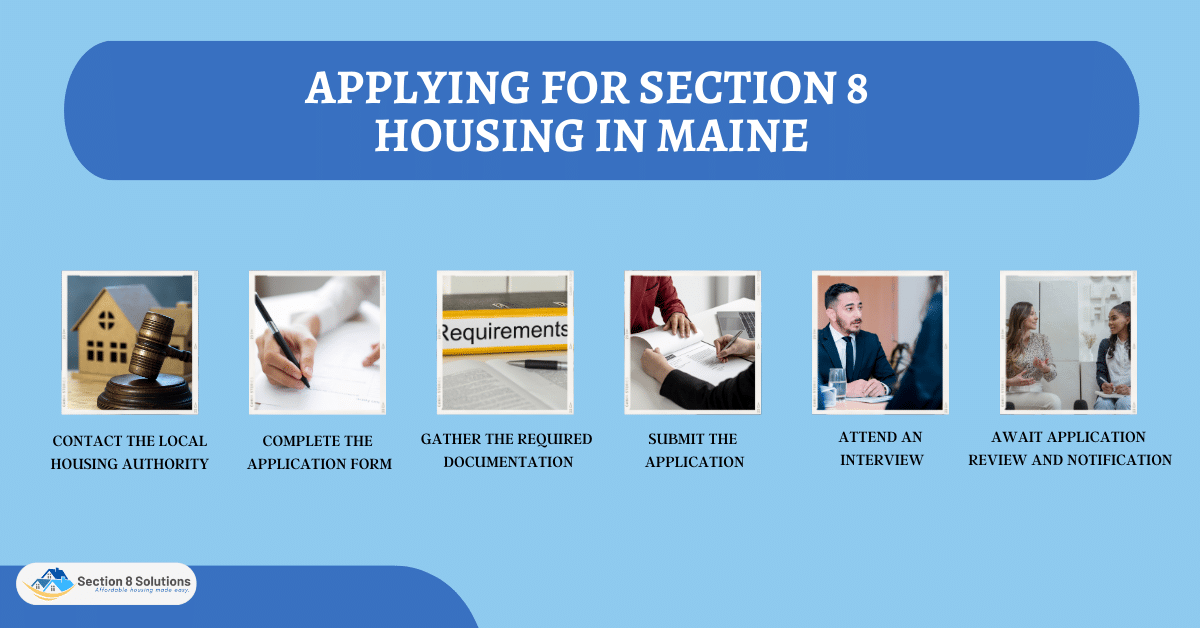
Step 1: Contact the Local Housing Authority or MaineHousing
Reach out to your local housing authority or Maine Housing to inquire about the availability of Section 8 housing and to obtain an application. You can find the contact information on the MaineHousing website or by calling their main office.
Step 2: Complete the Application Form
Fill out the Section 8 housing application form accurately and completely. Provide all the necessary information, including your name, contact information, household size, income details, and any relevant documentation required.

Step 3: Gather the Required Documentation
Collect the necessary documents to support your application. These may include:
- Proof of identity (such as driver’s license, passport, or birth certificate) for all household members.
- Social Security numbers or eligible immigration documentation for all household members.
- Proof of income for all household members (pay stubs, tax returns, or other income verification documents).
- Proof of assets (bank statements, investments, or property ownership).
- Rental history and references from previous landlords, if applicable.

Step 4: Submit the Application
Submit the completed application and all supporting documents to the local housing authority or Maine Housing office. Ensure that everything is accurately filled out and that you have included all the required documentation.
Step 5: Attend an Interview (if required)
Depending on the local housing authority’s procedures, you may be required to attend an interview as part of the application process. Be prepared to discuss your housing needs, income, and any other relevant information.

Step 6: Await Application Review and Notification
After submitting your application, it will be reviewed by the local housing authority or Maine Housing. The review process may take some time due to the high demand for Section 8 housing. Once your application is processed, you will be notified of the outcome by mail or email.
It is crucial to emphasize the importance of submitting accurate and complete information throughout the application process. Any inaccuracies or missing documentation can delay the review process or result in the rejection of the application. Double-check all the details and ensure that you have provided all the necessary supporting documents.

Conclusion
In conclusion, Maine Section 8 income limitations are crucial for eligibility and affordable housing. Income limitations, which vary by family size, guarantee help reaches the needy. Readers must check MaineHousing and other credible sources for updated income limitations and program criteria.
Affordable housing programs like Section 8 help low-income Maine families find homes. These initiatives bridge the income-rent cost gap to provide basic housing and enhance the quality of life. Recognizing and promoting such initiatives is crucial.







